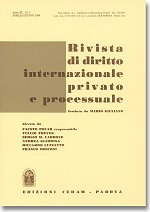I am grateful to Dr. Dafina Sarbinova, an advocate to the Sofia Bar, for this report.
In a judgment of of 2 September 2011 (Judgment No. 71 in commercial case No. 1193/2010 ), the highest Bulgarian court – the Bulgarian Supreme Court of Cassation, Commercial Chamber – struck down a one way arbitration/choice of court clause in a loan agreement (only in favour of the lender) as void. The Bulgarian court’s arguments to hold that are very similar to those of the French Supreme Court published last month, i.e. it was held that such clauses may be interpreted as purporting to establish by way of contractual arrangements a “potestative right” (that is, a right whereby a person may unilaterally affect the legal rights of another person/counterparty) which is not permitted under Bulgarian law, because such rights may only be established by an act of parliament in Bulgaria.
The facts may briefly be summarized as follows. A loan agreement was concluded between individuals (natural persons) in an entirely domestic situation. An arbitration clause in that agreement provided that all disputes that might arise had to be resolved by the parties amicably and if they failed to do so, the lender might initiate proceedings against the borrowers before the Court of Arbitration at the Bulgarian Chamber of Commerce and Industry (BCCI) or any other arbitration institution, or before the Regional Court of Sofia. A dispute arose and the lender brought an action before the Court of Arbitration at BCCI, which in turn, found that it was competent to hear the dispute and ruled that the borrowers under the agreement were jointly liable to pay a principal amount as well as the applicable interest rate. The borrowers initiated proceedings to set aside the arbitration award before the Supreme Court of Cassation claiming that the Court of Arbitration at BCCI lacked jurisdiction. They argued that the arbitration clause was against the good morals (a contract contra bonos mores) and thus illegal. Furthermore, the borrowers asserted that the arbitration clause breached the principle of parties’ equality in the process (which is a general principle under the Bulgarian civil procedural law).
According to the Supreme Court of Cassation the right of the lender in that case to choose at its own discretion the dispute solving body before which to exercise its public right to bring a claim falls within the category of “potestative” rights. The essential characteristic of a “potestative” right is the entitlement of one person (or a group of persons) to affect unilaterally the legal position of another person (or a group of persons), where the latter are obliged to bear with the consequences. Due to the intensity and potentially detrimental effects of “potestative” rights on third parties, they exist only by virtue of law and are not subject to contractual arrangements. On the basis of these arguments, the court concluded that a clause which in violation of law entitled one of the parties to unilaterally decide which dispute resolution body (an arbitration institution or a court) has a jurisdiction to resolve a particular dispute, is void pursuant to art.26, par.1 of the Bulgarian Contracts and Obligations Act. According to this provision, all contracts that violating or evading the law, as well as all contracts in breach of good morals, are void.
The arbitration/choice of court clause in that case was incorporated in a contract without an international element. However, the general character of the court’s arguments makes them equally applicable to agreements with an international element (if Bulgarian law applies towards the arbitration clause or even if a foreign law applies towards the arbitration clause).
The judgment of the Bulgarian court discussed here, may be open to criticism. Furthermore that judgment, as well as other judgments of the highest Bulgarian courts, does not have the power of a precedent binding all other courts to decide subsequent cases in the same manner. Nevertheless, the tendency of sticking down arbitration clauses with such reasoning (bearing in mind the similar French case) is a concerning one.
 This monograph written by Dr. Victoria Camarero Suárez and published by Tirant lo Blanch deals with one of the key issues of the modern conflict of laws: the multicultural society. The main thesis of the author is that the use of the full veil should not be considered as a challenge for the values and principles of democratic societies, particularly of the Spanish society, but as an ideal opportunity to demonstrate a real commitment with those principles and values. The extensive use of the comparative law method and the thorough review of the most relevant bibliography must be highlighted; also, the exhaustive analysis of the case law of different European states’ courts and of the European Court of Human Rights. Particular attention has been paid to crucial concepts such as public policy and the so-called “margin of appreciation”; in addition, other significant topics related to nationality and migration are dealt with, again through remarkable cases, like the controversial decision made by the Council of State of France (Conseil d’état) as regards the Silmi case. The balance and technical rigor with which the author has developed her research make of the monograph a pioneer study in the Spanish doctrine and abroad, at a time when the usual answers to sensitive legal issues having a great impact on minorities are based on ideological grounds and dogmatism.
This monograph written by Dr. Victoria Camarero Suárez and published by Tirant lo Blanch deals with one of the key issues of the modern conflict of laws: the multicultural society. The main thesis of the author is that the use of the full veil should not be considered as a challenge for the values and principles of democratic societies, particularly of the Spanish society, but as an ideal opportunity to demonstrate a real commitment with those principles and values. The extensive use of the comparative law method and the thorough review of the most relevant bibliography must be highlighted; also, the exhaustive analysis of the case law of different European states’ courts and of the European Court of Human Rights. Particular attention has been paid to crucial concepts such as public policy and the so-called “margin of appreciation”; in addition, other significant topics related to nationality and migration are dealt with, again through remarkable cases, like the controversial decision made by the Council of State of France (Conseil d’état) as regards the Silmi case. The balance and technical rigor with which the author has developed her research make of the monograph a pioneer study in the Spanish doctrine and abroad, at a time when the usual answers to sensitive legal issues having a great impact on minorities are based on ideological grounds and dogmatism.



 The
The  On September 2nd 2012, Professor Ole Lando celebrated his 90th birthday. This
On September 2nd 2012, Professor Ole Lando celebrated his 90th birthday. This